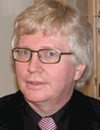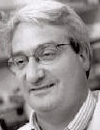Wednesday, 20 July 2011 |
Cell & Gene Therapeutics |
| | 08:00 | Registration | 09:30 |  | Keynote Presentation Development of Gene Therapy for Two Blood Disorders
Stefan Karlsson, Professor, Lund University, Sweden
Clinical gene therapy for inherited immunodeficiencies has been successful in the clinic since approximately 50 patients with these lethal disorders have been treated successfully. To develop gene therapy of hematopoietic stem cells for serious disorders that are not life-threatening, safer vectors and milder bone marrow ablation techniques will need to be developed. This presentation will address how we can use mouse models for Diamond Blackfan anemia and Gaucher disease to develop safe gene therapy for these disorders. |
| 10:00 | Gene Therapy for Cardiovascular Disease
Andrew Baker, Professor of Molecular Medicine, University of Glasgow, United Kingdom
I will discuss the latest advances in cardiovascular gene therapy and vector technology with a view to viral vectors and optimal patient groups. | 10:30 | Coffee Break and Networking in the Exhibition Hall | 11:15 | The Development and Application of Retroviral Vectors for Gene Therapy
Steven Howell, Senior Research Associate, National Institute for Medical Research, United Kingdom
Retroviruses are now used clinically to deliver therapeutic constructs for a range of inherited diseases. New approaches are being taken to improve safety, efficacy and specificity of these vectors and to develop them for different applications. | 11:45 | Gene Therapy for Muscular Dystrophy: Current Progress and Future Prospects
George Dickson, Director/Chair, Royal Holloway University of London, United Kingdom
RNA-targeted oligonucleotide therapies and adeno-associated virus gene-delivery-based strategies to treat muscle disease will be described. | 12:15 | Lunch and Networking in Exhibition Hall | 13:15 | Poster Viewing Session | 14:15 | Alipogene Tiparvovec: The First Gene Therapy for a General Metabolic Disorder
Harald Petry, Vice President, Amsterdam Molecular Therapeutics, Netherlands
During the presentation the various steps to develop a gene therapy medicinal product, will be discussed. Alipogene tiparvovec in LPLD will be used to demonstrate that persistent gene transduction after one-time intramuscular administration is feasible, and results in long term clinical improvements in the ‘chylomicronaemia syndrome’ caused by LPLD. | 14:45 | From Vials to Trials: Testing the Efficacy of Cystic Fibrosis Gene Therapy
Chris Boyd, Researcher, Edinburgh University, United Kingdom
After extensive pre-clinical and clinical studies, the UK Cystic Fibrosis Gene Therapy Consortium, a unique collaboration of academics and clinicians supported by the CF Trust, looks forward to a multidose clinical efficacy trial of a liposomal gene therapy formulation. | 15:15 | Coffee Break and Networking in the Exhibition Hall | 16:00 | Genetic Enhancement and Gene Doping: Fact or Fiction?
Hidde Haisma, Professor, University of Groningen, Netherlands
Genetic therapies may be used to improve healing of sports injuries or, alternatively, to enhance athletic performance. | 16:30 | Better Bioassays: Using Statistics to Design, Validate and Understand Bioassays
Kelly Fleetwood, Statistician, Quantics Consulting, United Kingdom
Are you developing a relative potency assay for your vaccine or other biologic? Or do you need to accurately and efficiently analyse data from an existing assay? By correctly applying statistics you can ensure that your assay is optimised and properly validated and also learn more from your data. | 17:00 | Developing Engineered Cell Therapy for Cancer
Robert Hawkins, Professor, University of Manchester, United Kingdom
| 17:30 | Drinks Reception |
Thursday, 21 July 2011 |
Vaccine Development and Manufacture |
| | 09:30 |  | Keynote Presentation Engineering Immune Potent DNA Vaccines for Difficult Pathogens
David Weiner, Professor/Chair, University of Pennsylvania, United States of America
DNA vaccines are an important novel vaccine technology, however the immune responses induced by past generations of DNA vaccines were poor in larger species including nonhuman primates and humans. We have recently utilized a combination of technologies for plasmid optimization, combined with enhanced EP delivery to dramatically improve the immune potency as well as ease of delivery of this platform. We will provide examples in nonhuman primates and report on progress in the clinic of this important enhanced platform. These studies have important implications for the new vaccine approaches to difficult pathogens. |
| 10:00 | Vaccine Strategies to Induce a Broad HIV CD8 T Cell Response
Steven Patterson, Senior Research Fellow, Imperial College, United Kingdom
The ability of HIV to mutate rapidly and escape immune recognition requires novel approaches to vaccine design. I will describe a vaccine strategy designed to induce CD8 responses against multiple epitopes and overcome the problem of immune escape. | 10:30 | Coffee Break and Networking in the Exhibition Hall | 11:15 | Advances in Meningococcal Vaccines
Ray Borrow, Head, Health Protection Agency, United Kingdom
Conjugate vaccines for meningococcal serogroups A, C, Y and W135 are now licensed whilst vaccines for serogroup B are well progressed in development. Issues including the necessity of booster doses for conjugate vaccines and current status of serogroup B vaccines will be presented. | 11:45 | Dynamics of Influenza A virus Replication in Mammalian Cell Culture
Udo Reichl, Professor, Max Planck Institute, Germany
In the next decades mammalian cell culture-derived influenza vaccines will play a crucial role in control of seasonal disease and pandemics response planning. Here, an overview is given on the dynamics of influenza A virus propagation in MDCK cells cultivated in bioreactors. | 12:15 | Lunch and Networking in Exhibition Hall | 13:15 | Poster Viewing Session | 14:15 | Development of Inactivated Polio Vaccine using Attenuated Sabin Poliovirus Strains for Clinical Studies and Technology-Transfer Purposes
Wilfried Bakker, Senior Research Scientist, Netherlands Vaccine Institute, Netherlands
A production process for Sabin-inactivated polio vaccine (Sabin-IPV) is being developed. For that, a scale-down – scale-up strategy was followed, initially using historical Salk-IPV manufacturing data. Using a lab-scale model, the process was developed up to production-scale and used to generate clinical lots. Technology transfer to manufacturers in low income countries is foreseen. | 14:45 | New Concept for Next Generation of Vaccine Facilities
Klaus Hermansen, Senior Specialist, NNE Pharmaplan, Denmark
There is a Global need for more affordable vaccines especially for the emerging countries. This presentation will give a introduction to a new concept for modern flexible vaccine facilities that can generate a platform for lowering the cost of manufacturing of vaccines. By combining Standardisation with the use of Single use technology and Modular engineering and construction it is possible to lower the cost of a new vaccine facility by 40-50%. The topic will be presented as a case story. | 15:15 | Coffee Break and Networking in the Exhibition Hall | 16:00 | Lost in Translation? - The Missing Links from Academic Research to Clinical Trials in the Vaccine Field
Sarah Moyle, Head, University of Oxford, United Kingdom
Translational research and technology transfer is a minefield of problems waiting to explode. Even the overall meaning of the term translational research means different things to different people which can also cause an additional layer of confusion. The talk will focus on translational research in general and how this challenging area is being addressed at the University of Oxford's Jenner Institute’s vaccine programme. Here likely vaccine candidates emanating from the academic research base are manufactured by a translational academic group for use in an academic led first in man clinical trials. | 16:30 | Vaccine Development: Leveraging Alternative Expression Systems in the Development and Manufacture of a Human Hookworm Vaccine
Jordan Plieskatt, Director, Analytical Development and Formulation, The George Washington University/Sabin Vaccine Development, United States of America
Alternative expression systems are beginning to provide suitable alternatives to difficult to express recombinant proteins. These systems, specifically Nicotiana benthamiana, while presenting their own challenges including host cell proteins, have enabled the development of a human hookworm vaccine. | 17:00 | Close of Conference |
|
